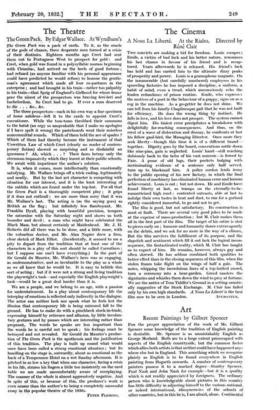The Cinema A Nous La Liberte. At the Rialto. Directed
by Rene Clair Two convicts are making a bid for freedom. Louis escapes ; Emile, a victim of bad luck and his better nature, renounces his last chance in favour of his friend and is recap- tured. Years afterwards he is released. His friend's luck has held and has carried him to the ultimate dizzy peaks of prosperity and power. Louis is a gramophone magnate. On the innumerable (but carefully numbered) employees in his sprawling factories he has imposed a discipline, a uniform, a habit of mind, even a tread, which unconsciously echo the leaden redundance of prison routine. Emile, who expresses the motives of a poet in the behaviour of a puppy, signs on as 11 cog in the machine. As a go-getter he does not shine. We can tell from his faintly Chaplinesque gait that he was not built for efficiency. Ile does the wrong thing by instinct. Be falls in love, and his love does not prosper. The system cannot digest him. His tiniest error precipitates a breakdown with delightfully far-reaching consequences. And thus, on the crest of a wave of dislocation and dismay, he confronts at last his fellow gaol-bird, the Managing Director. Once more they seek liberty—though this time it is of a different brand— together. Dignity goes by the board, conventions rattle down like nine-pins, gain is neglected. Louis' hand—still reaching dubiously back to the helm of his vast concern—is forced by Fate. A posse of old lags, their pockets bulging with incriminating evidence of a sentence only half served, turn up to blackmail him. A police cordon lends irony to the public opening of his new factory, in which the final perfection of machinery has eliminated human error and human achievement. Louis is out ; but not down. He and Emile have found liberty at last, as tramps on the eternally-to-be- romanticized high road : contented outcasts, able at last to indulge their own tastes in heat and dust, to run for a garland rightly considered immortal, to go and not to get.
The film is good, but not satisfactory. Its construction is most at fault. There are several very good jokes to be made at the expense of mass-production ; but M. Clair makes them all in the first part of the film. The target of his satire is shot to pieces early on ; humour and humanity dance extravagantly on the debris, and we ask for no more in the way of a climax. But the film survives the fulfillment of its purpose, and the slapstick and sentiment which fill it out lack the logical incon- sequence, the fantasticated reality, which M. Clair has taught us to expect of him. He remains, however, always gay and often shrewd. He has seldom combined both qualities to better effect than in the closing sequences of this film, when the stolen francs take flight on the wings of half a gale. The notes, whipping the incredulous faces of a top-hatted crowd, turn a ceremony into a bear-garden. Greed roasters the dignitaries and whistles them down the wind to prey at fortune. We see the antics of Tom Tiddler's Ground in a setting caustic- ally suggestive of the Stock Exchange. M. Clair has failed only by his own high standards. A NOM La Liberte is the best
film now to be seen in London. ArEstarerus.






































 Previous page
Previous page